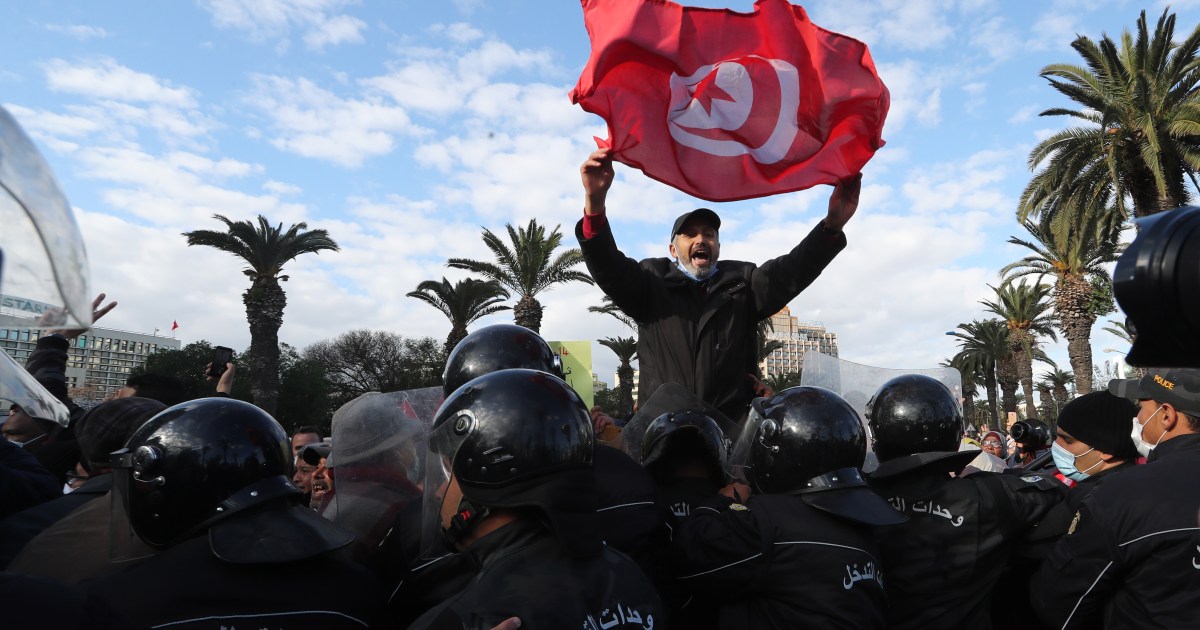The American Bloomberg website said that despite Tunisian President Kais Saied's denial of seeking to establish a one-man regime and his emphasis on protecting freedoms, the escalation of repression in the country is seen by many as a warning sign for Tunisia's nascent democracy, and it is one of the few remaining achievements of the 2011 popular revolution that It toppled a long-lived dictator and inspired years of turmoil across the Arab world.
The website - in a report by Jihan Laghmari and Suhail Karam - indicated that with the dwindling of freedoms and the collapse of the economy under Said's rule, anger and unrest in Tunisia boil again, threatening to explode the situation throughout the country.
He added that after a landslide victory in the 2019 elections, Said (former law professor) was accused of crushing the revolution by seizing power and suppressing the opposition through practices that brought back to mind the echoes of the days of ousted President Zine El Abidine Ben Ali.
The site reported that Saeed - a hard-line figure who delivers his speeches in fluent Arabic - defended his decisions to freeze parliament and dismiss the prime minister last July, as they were necessary to save the country from chaos and corruption.
And last Thursday, Said said in Brussels when asked by journalists about the accusations against him that "as General Charles de Gaulle once said, I cannot at this age begin my career as a dictator."
The American website indicated that if Tunisians had enjoyed until recently the freedom of expression that they had recently discovered, Saeed’s critics can now face trial for simply broadcasting a post on Facebook, as happened with one of the lawyers who was sentenced in absentia last Friday to 10 months in prison, just because He described the president's moves as a "coup".
As for the protests that formed a key element in the Tunisian political scene during the past decade as successive governments struggled to tackle economic problems, they are now facing more frequent repression, as the number of secret arrests of potential opponents has doubled, according to Human Rights Watch.
These developments come - the site adds - at a difficult time for the economy of this North African country that is dependent on tourism and agriculture, after years of mismanagement, exacerbated by the conditions of the Corona pandemic, prompting the authorities to obtain a rescue plan from the International Monetary Fund that will likely need a political consensus on the cuts. Painful spending that will include.
Gross domestic product decreased in 2020 by 8.8%, and its growth was limited last year, and the Central Bank of Tunisia warned that the prospects for recovery in 2022 were “shy,” and inflation last December recorded its highest level in more than two years.
While Saeed's critics are constantly waiting for security men to knock on the doors of their homes, the latter seeks to penetrate democratic institutions, which he started in late July by suspending parliament and dismissing the prime minister, then taking over control of the judiciary and ruling by decrees and appointing a government with fewer powers.
rare call
And this month, Saeed replaced the Supreme Judicial Council, which guarantees the independence of the judiciary, with a new body under his tutelage, and last Tuesday dismissed the head of the national radio, which is a "dangerous situation" for the human rights situation in the country, according to what he described as warning the head of the Syndicate of Tunisian Journalists, Mohamed Jelassi, during a press interview. .
This month, the United Nations and Western powers issued a "rare invitation" to Saeed to respect the independence of the judiciary, but there has been a modest international reaction so far to his decisions.
As he consolidates power, Bloomberg asserts, Said is abandoning his longtime comrades and becoming more and more isolated.
Youssef Cherif, director of Columbia Global Centers in Tunisia, said that Said surrounded himself with smart people, "but the unpredictable nature of his rule impedes their independence in implementing any strategy...Those who think about the economy are not in his close circle, on the other hand." Reflect the security figures, police officials, legal experts, and activists supporting his campaign."
The approach of the Tunisian president - the site adds - also shocked Abdel Raouf Baltaib, a former adviser to Said who resigned in 2020 and later joined a movement called "Citizens Against the Coup", who said during one of the interviews summarizing the scene, "I no longer know the man I lived next to since 40 years old."

